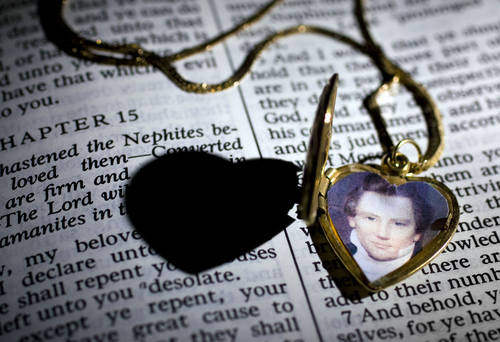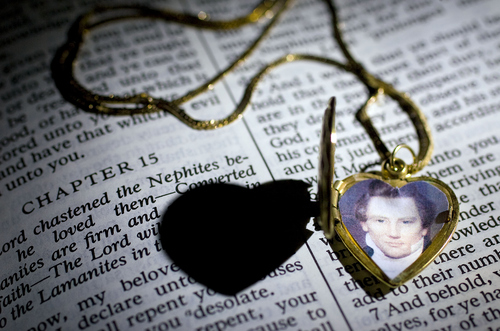This is an archived article that was published on sltrib.com in 2013, and information in the article may be outdated. It is provided only for personal research purposes and may not be reprinted.
Those who prefer a quiet reading environment are bound to be disappointed while skimming the pages of Jane Barnes' Falling in Love With Joseph Smith.
That's because it won't matter how silent your local library or living room may be. Barnes' swooning ode to The Church of Jesus Christ of Latter-day Saints' founding prophet is sometimes so loud and rapturous it recalls classic documentary footage of a Beatles concert.
Open her book at any page. Barnes' enthusiasm overflows in torrents of prose. She praises Smith's "sacred humor," his "inspired sense of fun" translating the Book of Mormon "out of a hat," his art of arranging Christian doctrine anew in the spirit of a "naïve modernist."
Then there is Smith's voice — "like a muscular swirl in a velvet tent" — heard so clearly by Barnes during her work as co-writer for the 2007 PBS special series "The Mormons" that she almost converted to the LDS faith. Almost, except Barnes settled instead for what she calls her "near-life experience in Mormonism."
"I do get funny looks sometimes when I talk about Joseph," Barnes said during a telephone interview from her home in Charlottesville, Va. "But mostly I can't understand why other people don't jump up and say, 'Yes, I see what you mean!' "
—
Joseph, unbound • Released late last summer, Falling in Love With Joseph Smith never scaled the heights of any best-seller list. Even today, nine months after its publication by Tarcher, a division of Penguin, it hovers quietly at the 436,000 rank of best-selling titles on amazon.com, where it also garnered reviews between one and five stars.
But a small band of ardent admirers say Barnes' book heralds an important development in books about the LDS Church and its history. Nestled between a heartfelt appreciation and honest appraisal of Smith's personal history, Falling in Love … is neither blind exercise in hero-worship nor full-throated denunciation of Mormonism's most central figure.
"I don't know how much it's widely read, but it should be widely read," said Gregory A. Prince, a medical researcher, active "but not orthodox" Mormon and author of David O. McKay and the Rise of Modern Mormonism. "Because of its content, and the elegance of its prose, it will endure."
Rob Lauer, a Virginia-based television writer and playwright, said he was struck by how closely Barnes' discovery of Smith mirrored his own. Raised Methodist, he converted to the LDS Church at age 17, graduated from Brigham Young University, but later left the church as an adult to become what he calls a "reform Mormon."
"She's tapped into something essential about Joseph Smith's character that's been lost through our high-minded, what I sometimes call 'visitors center' version of the man," Lauer said. "Her book signals that nonmembers can write about Joseph in an unorthodox way, but that doesn't make her work anti-Mormon in the least. The line between what the LDS Church as an institution says about him and what the anti-LDS contingent says about him is going to fade away, and is already starting to fade away."
—
The warts, but also the wonder • Barnes acknowledges what she sees as Smith's faults as established through her historical research — his falsehoods to wife Emma, his temper tantrum destroying a printing press, the changing stories behind his early revelations. But she defends him as one of the United States' most influential and important spiritual figure, even a "true modern" ahead of his time. The trick, she said, was learning to embrace Smith's beauty and sometimes disturbing complexity in the same way Americans make allowances for the darker side of Founding Fathers such as Thomas Jefferson, a slave-holder.
Raised in a "WASPy" East Coast family, Barnes said she never related to Christianity until researching the historical Joseph Smith as an adult. His folk-religious magic, the audacity of his claims, his legacy behind the Book of Mormon and, above all, his idea of the progression of man into Godhood spoke to her beyond what she calls the "established clichés" of mainstream Christianity.
"Here comes somebody who, by the seat of his pants, comes up with a way of connecting to Christianity and God, and he does it by putting his face in his hat. He tells us we can find the mystical and spiritual in whatever seems magical to us at the moment, that we can glow in the otherworldliness of everyday life," Barnes said. "He's modern to me in the same way a modern artist is, using bits and pieces of religious narrative from the past to redefine God through redefining Jesus Christ."
Barnes believes Smith's shocking theology of man's progression toward godhood means he shares a seat in the same company with Buddha, who granted humanity the notion of becoming one with the universe, and other religious thinkers with original ideas. On the other hand, her take on Smith's true motivations behind the establishment of polygamy will confuse most practicing Mormons.
"I'm sure Joseph would be a feminist today, and for gay marriage. I think it's only his 19th-century culture that would have constrained him. He was a terrifically radical, fair-minded person," she said. "It was part of his modernity that he wanted sex, love and freedom to be part of a religious vision."
Barnes' idiosyncratic attraction to Smith as a fascinating, but flawed, prophet has angered some LDS readers. The fact that her curiosity for the prophet was piqued by, of all books, Fawn Brodie's famous and contentious No Man Knows My History is for some even more troubling.
"Latter-day Saints who have the book consider it a quirky, very personal, sometimes negative, treatment of Joseph Smith whom Jane claims to love. Who can explain such contradictions?" wrote Maurine Proctor, a contributor to the online Meridian Magazine, a publication of LDS views. "Perhaps her first encounter with Joseph through the writings of Fawn Brodie forever jaded her so that she could never see Joseph Smith as someone more than a genius fabricator. She has a utopian longing for what he taught, but cannot take him as a prophet of God."
—
History, and faith, acknowledged • Barnes hints widely that the contradictions of Smith's legacy are no stumbling block, comparing him to America's great poet of spiritual energy and contradiction, Walt Whitman. In perhaps the book's most freewheeling section, she imagines the young Joseph Smith sharing his revelations with Tom Sawyer and Huck Finn, and sharing whiskey and a cigarette on "a lovely dimpled slope of Hill Cumorah."
Barnes writes that Tom notices how, "when [Smith] looks inside his soul, he's imagining as often as he's praying."
Barnes' love affair with Smith brought her to the brink of conversion. In the end, she decided the LDS Church's "confining nature" and political positions were elements she couldn't sign on to. She also feels the official church has not embraced the historical Joseph Smith, and his theology of man's progression toward Godhood, as much as it could and should.
Prince points out that little in Barnes' book reveals anything historically new about Smith's life or legacy. It's her enthusiastic view of Smith, couched firmly in events of early church history — which Prince said many of today's LDS faithful prefer to avoid — that sets the book apart.
"Mormons generally are appallingly ignorant of who they are as Mormons. They have little sense of their history. Mormonism as a religion is tied to history in an inextricable manner, and because of the Internet, people today can no longer escape that," Prince said. "Jane's treatment is one of the gentler paths to safer ground. She shows us how you can put a human face on Joseph Smith without necessarily destroying faith."
Twitter: @Artsalt
Facebook.com/fulton.ben —
Falling in Love with Joseph Smith
Jane Barnes
Tarcher/Penguin
Pages • 304
Price • $25.95





